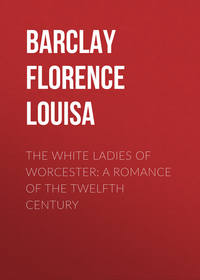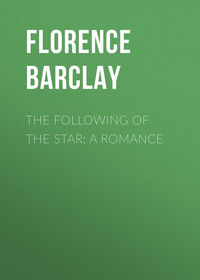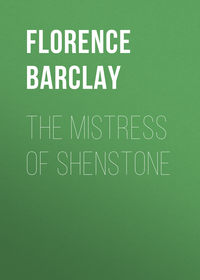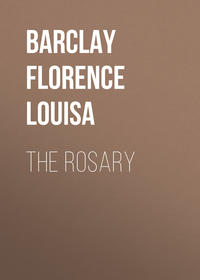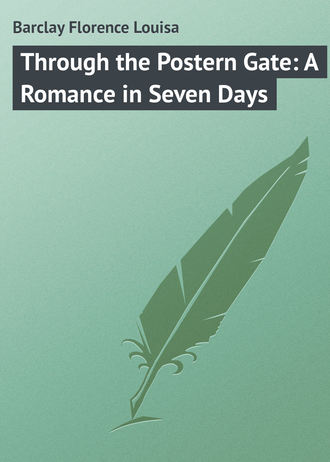 полная версия
полная версияThrough the Postern Gate: A Romance in Seven Days
Then the old clergyman said: "Let us pray"; and, kneeling meekly upon her knees, Christobel Charteris prayed, with all her heart, that she might be a good wife to her old friend, the Professor.
From the church, they drove straight to the station, Miss Ann's plan for them being, that they should lunch in London, reach Folkestone in time for tea, and spend a day or two there, at a boarding-house kept by an old cronie of Miss Ann's, before crossing to Boulogne, en route for Brussels.
Christobel disliked the idea of the boarding-house, extremely. She had never, in her life, stayed at a boarding-house; moreover it seemed to her that a wedding journey called imperatively for hotels – and the best of hotels. But Miss Ann had dismissed the question with an authoritative wave of the hand, and a veiled insinuation that hotels – particularly Metropole hotels – were scarcely proper places. Dear Miss Slinker's boarding-house would be so safe and nice, and the company so congenial. But here the Professor had interposed, laying his hand gently on Christobel's: "My dear Ann, we take our congenial company with us."
This was the farthest excursion into the realm of sentiment, upon which the Professor had as yet ventured. The sober, middle-aged side of Miss Charteris had appreciated it, with a certain amount of grateful emotion. But the youthful soul of Christobel had suddenly realized how the Boy would slap his leg, and rock, over the recital of such a sentence; and, between the two, she had been reduced to a condition bordering on hysterics.
They travelled from Cambridge in a first-class compartment, had it to themselves, and fell quite naturally into the style of conversation which had always characterized their friendship; meeting each other's minds, not over the happenings of a living present, but in a mutual appreciation of the great intellects of a dead and gone past. Before long, the Professor had whisked his favourite Persian poet from the tail-pocket of his coat, Christobel had provided paper and pencil, and they were deep in translation.
Arrived at Liverpool Street station, they entered a four-wheeler, and trundled slowly off to Cannon Street. Christobel had imagined four-wheelers to be obsolete; but the Professor dismissed her suggestion of a taxi, as being "a needlessly rapid mode of progression, indubitably fraught with perpetual danger," and proceeded to hail the sleepy and astonished driver of a four-wheeled cab.
(Oh, Boy dear, what would you have said to that four-wheeler – you dear record-breaking, speed-limit-exceeding, astonishingly rapid Boy? That ancient four-wheeler, trundling past the Bank of England, the Royal Exchange, the Mansion House, up King William Street, and round into Cannon Street, endlessly blocked, continually pulling up; then starting on, only to be stopped again; and your Belovèd inside it, Boy dear, looking out of the ramshackle old window, in a vain endeavour to see something of the London you had planned to show her in your own delightful extravagant way. Oh, Boy dear, keep out of this! It is not your show. This four-wheeler has been hailed and engaged by the Professor. The lady within is the bride of the Professor. Hands off, Boy!)
They drew up, for a few minutes, outside a bookseller's in New Broad Street, on the left-hand side, just after they had trundled into it – a delightful little place, crammed, lined, almost carpeted, with books. The Professor plunged in, upsetting a pile of magazines in his hasty entrance through the narrow doorway. Here he always found precisely the book he happened to be requiring for his latest research. With an incoherent remark to the proprietor, who advanced to meet him, the Professor became immediately absorbed, in a far corner of the shop, oblivious of his cab, his bride, and his train. Christobel had followed him, and stood, a dignified, but somewhat lonely figure, just within the doorway. She had been to this shop with her father, during his lifetime, on several occasions, and had since often written for books. The bookseller came forward. He was a man possessed of the useful faculty of remembering faces and the names appertaining to them. Also he had cultivated the habit of taking an intelligent interest in his customers. But he did not connect this beautiful waiting figure, with the absorbed back of the Professor.
"What can I do for you to-day, Miss Charteris?" he inquired, with ready courtesy.
Christobel started. "Nothing to-day, thank you, Mr. Taylor. But I am much obliged to you for so often supplying my requirements by return of post. And, by the way, you have an excellent memory. It is many years since I came here last, with my father."
"Professor Charteris was one of my best customers," said the bookseller, in an undertone of deferential sympathy. "I never knew a finer judge of a book than he. If I may be allowed to say so, I deeply deplored his loss, Miss Charteris."
Christobel smiled, and gently unbent, allowing the kindly expression of appreciation and regret to reach her with comfort in these moments of dream-like isolation. A friendly hand seemed to have been outstretched across the chasm which divides the passionately regretted past, from the scarcely appreciated present. She could see her father's tall scholarly figure, as he stood lovingly fingering a book, engaged in earnest conversation with Mr. Taylor, regardless of the passing of time; until she was obliged to lay her hand on his arm, and hurry him through the crowded streets, down the steep incline, to the platform from which the Cambridge express was on the point of starting. And when safely seated, with barely a minute to spare, he would turn to her, with a smile of gentle reproof, saying: "But, my dear child, we had not concluded our conversation." And she would laugh and say: "But we had to get home to-night, Papa." Whereupon he would lean back, contentedly, replying: "Quite right, my dear. So we had."
Ah, happy those whose fathers and mothers still walk the earth beside them. Youth remains, notwithstanding the passing of years, while there is still a voice to say, in reproof or approbation: "My child."
But the bookseller, not yet connecting her with the Professor, still waited her pleasure; and suddenly a thought struck Christobel. An eager wish awoke within her.
"Mr. Taylor," she said, hurriedly; "can you supply me with the very newest thing on the subject of aviation? I want to learn all there is to know about propellers, steering-gear, cross-currents, and how to avoid the dangers – "
She stopped short. The Professor had found what he wanted, and was fumbling for his purse.
The bookseller turned quickly to a pile at his elbow, took up a paper-covered book, and placed it in her hands. "The very latest," he said. "Published yesterday. You will find in it all you want to know." Then, as he handed the Professor his change, "Allow me to place it to your account, Miss Charteris," he said.
Experiencing a quite unaccountable sense of elation and fresh interest in life, Christobel, armed with her book on aviation, re-entered the four-wheeler. The Professor, absorbed in his own purchase, had not noticed her private transaction. He followed her into the cab, and made three ineffectual attempts to close the door. Just as the driver was slowly beginning to prepare to climb down, Mr. Taylor came across the crowded pavement, to their rescue; released the Professor's coat-tail, shut them in, and signed to the cabman to drive on. With a good deal of "gee-up" and whip-flourishing, they re-commenced to trundle. Mr. Taylor was not merely a provider of literature; he was also a keen observer of life, and of human nature. As Christobel leaned forward to acknowledge his help, and to smile her farewell, his expression seemed to say: "A four-wheeler, Professor Harvey, and the latest work on aviation! An unusual combination." "Very unusual," she said to herself, and smiled again. Then it seemed to her that her friend of the bookshop had said: "You will find what you want, on page 274." She knew he had not, as a matter of fact, mentioned any page; but the figures came into her mind. She opened the book, and glanced at page 274. It was headed: "Fine performances by Mr. Guy Chelsea." She shut it quickly. There was no room for the actual presence of the Boy in the Professor's four-wheeler.
They lunched at a depôt of the Aerated Bread Company, close to Cannon Street station. While Christobel was struggling with a very large plateful of cold tongue, she suddenly remembered that one of the Boy's many plans had been to take her to lunch at his favourite restaurant in Piccadilly; where she would be able to order any dish she fancied, and find it better served than she had ever known it before; or to dine at the Hotel Metropole, where Monsieur Delma's perfect orchestra would play for her any mortal thing for which she chose to ask, and play it better than she had ever heard it played.
These memories, and a really excellent cup of coffee, helped Christobel in her struggles with the round of cold tongue; and she looked across the little marble-topped table brightly at the Professor, and spoke with a cheerful hopefulness which surprised herself.
But something, other than his own plate of cold tongue, seemed weighing on the Professor. He had become preoccupied and distrait.
When they reached the Folkestone train, Christobel found out the cause of his preoccupation.
"My dear Ann – I should say Christobel," remarked the Professor, hurriedly, as he put her into an empty compartment, and hesitated in the doorway. "I am always accustomed at this hour to have my pipe and a nap. Should you object, my dear Ann – er – that is, Christobel, if I sought a smoking compartment?"
"Oh, please do!" she exclaimed, eagerly. The idea of two hours of freedom and solitude suddenly seemed an undreamed of joy. "Don't think of me. I am quite happy here."
"I will provide you with a paper," said the Professor, and hailed a passing boy. He laid the paper on her lap, and disappeared.
The train started.
Christobel looked out of the window as they slowly steamed across the bridge over the Thames. She loved the flow of the river, with its constant procession of barges, dredges, boats, and steamers; a silent, moving highway, right through the heart of the noisy whirl of London street-traffic. They ran past old St. Saviour's Church, now promoted to be Southwark Cathedral; out through the suburbs, until streets became villas, woods and meadows appeared, and the train ran through Chislehurst – peaceful English resting-place where lie entombed the bright Imperial hopes of France – then on through Sevenoaks, into the bowery green of the Kentish hop-gardens.
After passing Sevenoaks, she took up the Professor's paper and glanced at it. Somehow she had felt sure it would be the Daily Graphic. It was the Daily Mirror! She had never held a halfpenny illustrated paper in her hands before. No doubt it was an excellent paper, and met the need of an immense number of people, to whom an additional halfpenny a day would be a consideration. But, that the Professor, when providing her with one paper, should have chosen a halfpenny instead of a penny paper, seemed to hold a curious significance, and called up sudden swift memories of the Boy. He would have bought Punch, the Graphic, the Illustrated, the Spectator, and a Morning Post, plumped them all down on the seat in front of her; then sat beside her, and talked, the whole journey through, so that she would not have had a moment in which to open one of them.
(Oh, Boy dear! Don't look at this Daily Mirror. You might misjudge the good Professor. With your fifty thousand a year, how can you be expected to understand a mind which must consider ha'pence, even when brides and wedding journeys are concerned. Do keep away, Boy dear. This is not your wedding journey.)
Then she opened the Daily Mirror, and there looked out at her, from its central page, the merry, handsome, daring face of her own Little Boy Blue!
He was seated in his flying machine, steering-wheel in hand, looking out from among many wires. His cap was on the back of his head; his bright eyes looked straight into hers; his firm lips, parted in a smile, seemed to be saying: "I jolly well mean to do it." Beneath was an account of him, and a description of the flight he was to attempt on that day, across the Channel, circling round Boulogne Cathedral, and back. He was to start at two o'clock. At that very moment he must be in mid-air.
Oh, Little Boy Blue! Little Boy Blue! You have a way of making hearts stand still.
The boarding-house proved to be a place decidedly conducive to the taking of a fresh-air cure; because nobody remained within its four walls, if the weather could possibly admit of their going out.
As soon as Christobel and the Professor had taken tea, and replied to Miss Slinker's many questions, they went out to walk on the Leas until sunset. It was a radiant afternoon, and the strong wind which had suddenly arisen, blowing, in unexpected gusts, from the sea, acted as a tonic to weary heart and brain. Christobel, holding on her hat as she walked, battled her way beside the Professor, up a cross street, into the Sandgate Road.
There they went to the telegraph office, and sent Miss Ann news of their safe arrival, and of the extreme comfort they felt sure of experiencing at Miss Slinker's delightful abode. (This was the Professor's wording.)
They looked in at Parson's Library just to order a book Miss Ann wanted; and, on a little farther, just to match some crewel silks for a tea-cosy Miss Ann was making.
These commissions duly executed, they were free to make their way to the Leas parade, whence they would look down upon the beach, and enjoy a distance view across the Channel. They took the side street which brought them out upon the esplanade, close to the lift by which people continuously mounted or descended the steep face of the cliff.
A considerable crowd lined the esplanade railing, looking over eagerly. Apparently there was some object of particular interest to be seen below.
Christobel and the Professor advanced to the railing, and also looked over.
She saw a strange thing floating in the sea, between the promenade pier and the harbour. It seemed a huge insect, with broken wings. Its body was a mass of twisted wires. Around this, a little fleet of rowing-boats had gathered. They looked black, on the blue wind-swept waters, like water-boatmen on a village pond. They darted in and out and round about the wreckage of the huge wings and twisted wire, and seemed waiting for a chance to help.
A man stood next to Christobel and the Professor; a man who talked to himself.
"Ah, poor chap," he said; "poor chap! So nearly back! So nearly broke the record! Such a sport!"
"What is that thing in the water?" inquired the Professor.
The man turned and looked at him.
"An aeroplane," he said, slowly, speaking with a sort of stolid deliberation. "A wrecked aeroplane. Caught in a cross-current, worse luck! Just accomplished one of the finest flights on record. Started from up here; skimmed over the Channel to Boulogne; circled round the cathedral – such a clear day; we could watch the whole flight with field-glasses – came gaily back without a stop; was making for the cliff again, when a cross-current caught him; something went wrong with the steering-gear; and down it goes, with a plunge, head first into the sea."
"And the – er – occupant?" inquired the Professor.
"The aeronaut? Ah, he didn't fall clear, worse luck, or they could soon have fished him out. He stuck to his seat and his wheel, and fell smash in among his wires. They are trying to extricate him now. Bad luck, poor chap! Such a sport."
"Do you know his name?" asked the Professor, peering down at the waiting crowd which lined the beach.
"Guy Chelsea," said the man. "And I give you my word, he was the finest, pluckiest young amateur we had among the airmen."
Then Christobel's heart began to beat again, and her limbs seemed to regain the power to move.
"He is mine," she said. "I must go to him. He is my own Little Boy Blue." And she began to run along the Leas toward the stone steps which zigzag down to the shore.
She heard the Professor running after her.
"Ann," he called, "Ann! Stay! This is – most – unnecessary!"
She flew on.
"At least take the lift!" bawled the Professor.
She hurried on and reached the steps, pausing an instant to glance back.
The Professor had stopped at the lift, and was waving to her with his umbrella.
She could never remember running down those steps. In what seemed but a moment from the time she reached them, she found herself stumbling painfully down the steep slope of shingle to the water's edge.
The lift, bearing the Professor, had just begun to crawl down the face of the cliff. She could see him gesticulating through the glass windows.
The crowd on the shore, chiefly composed of rough men, was thickest round the base of a wide stone breakwater, jutting out into the sea. On this break-water stood an empty stretcher. A coast-guardsman marched up and down, keeping the crowd off the breakwater.
Christobel reached the outskirts of the crowd, and could get no farther.
"Please let me through," she said. "I belong to him. He is mine."
They turned and looked at her.
"She's 'is mother," said a voice. "Let 'er through."
"Mother be blowed!" said another voice, hoarsely. "Get out! She's 'is wife."
"Yes," she cried eagerly. "Yes! Oh, do let me through! I am his wife."
Suddenly she knew it was true. The Boy's great love had made her his wife. Had he not said: "You and I are one, Christobel; eternally, indissolubly one. You will find it out, when it is too late"?
The crowd parted, making a way for her, straight to the foot of the breakwater.
She mounted it, and walked towards the empty stretcher.
The coast-guardsman confronted her.
"He is mine," she said, quietly. "I have the right to be here."
The man saluted, in respectful silence.
She stood gazing out to where the crowd of boats hovered about the great insect with broken wings.
The sea gleamed golden in the sunset.
One boat, larger than the rest, slowly detached itself from the general mêlée, pulling with measured stroke toward the breakwater.
Something lay very still in the bow, covered with a sail-cloth.
Two coast-guardsmen rowed; one steered.
The boat came toward the breakwater, in a shaft of sunlight.
Christobel turned to the man beside her.
"Is there any hope?" she asked.
"'Fraid not, lady. My mate just signalled: all U P."
"Ah!" she said, looking wide-eyed into his face. "Ah! – But there must be pioneers."
The coast-guardsman turned and walked toward the crowd.
"She's 'is wife, men," he said, with a jerk of his thumb over his shoulder. "She's 'is wife; yet when I told her it was all U P, she said: 'There must be pioneers.'"
The crowd of roughs doffed their caps.
The boat drew slowly nearer.
Then she saw the Professor, hurrying down the shingle, waving his umbrella.
He must not come yet.
She advanced to the shore end of the breakwater, and spoke to the crowd.
"Please," she said, "oh, please, if possible, prevent that gentleman from reaching the breakwater."
They turned, and saw the advancing figure of the Professor, flurried and irate.
"'Ullo, Bill," cried a voice. "She says: Don't let the old bloke through."
They passed the word from one to the other. "Don't let the old bloke through." They closed the outer ranks, standing shoulder to shoulder. The Professor's umbrella waved wildly on the outskirts.
She moved along the breakwater. Yes, that was it. "Don't let the old bloke through." She had never used such a word in her life before, but it just met the needs of the case. "Don't let the old bloke through."
The boat drew nearer.
A bugle, away up on the cliff, sounded the call to arms.
"Little Boy Blue, come blow me your horn! The cow's in the meadow; the sheep, in the corn. Where is the boy who looks after the sheep? Ah, dear God! Where is the Boy? Where is the Boy? Where is the Boy? – He's under the sailcloth – fast asleep."
The boat drew nearer. She could hear the measured plash of the oars; the rhythmic rattle of the rowlocks. They advanced, to the beat of the words in her brain.
"There must – be pion – eers! Don't let the old bloke through. Oh, where is the boy who looks after the sheep? He's under the sail-cloth, fast asleep."
The boat drew level with the breakwater, grating against it.
"Under the sail-cloth, Boy dear; under the sail-cloth – fast asleep."
Tenderly, carefully, they lifted their burden. As the boat rocked, and their feet shuffled beneath the weight, she closed her eyes. When she opened them once more, the quiet Thing under the sail-cloth lay upon the stretcher. Every man within sight stood silent and bareheaded.
The bugle on the cliff sounded: "lights out."
The golden shaft of sunlight died from off the sea.
Then she came forward, and knelt beside her Boy.
Suddenly she understood the cry of anguish wrung from the loving heart of a woman at a tomb: "Tell me where thou hast laid Him, and I will take Him away!" Oh, faithful heart of woman, alike through all the ages; ready, with superhuman effort, to prove a limitless love and a measureless grief!
She knelt beside the stretcher, and lifted the sail-cloth.
Yes, it was the Boy – her own Little Boy Blue.
His curly hair was matted with blood and salt water. There was a deep gash across his temple, from the ear, right up into the hair His eyes were closed; but his lips smiled, triumphant. "There must be pioneers! Every good life given, advances the cause." "Yes, Little Boy Blue. But has it ever struck you, that, if you marry, your wife will most probably want you to give up flying; not being able to bear that a man who was her ALL, should do these things?" She lifted the sail-cloth quite away, and stood looking down upon him, so shattered, yet so beautiful, in his triumphant sleep.
Suddenly her arm was seized from behind. She turned.
The Professor had succeeded in pushing his way through the crowd, and in mounting the breakwater. His cravat was awry; his top-hat was on the back of his head. He looked at her through his glasses, in amazed indignation.
"Christobel," he said, "this is no place for you. Come away at once. Do you hear? I bid you come with me at once."
The only thing she really minded was that his hat was on, in the presence of her Dead.
She could not free her arm from the grip of the Professor.
She turned and pointed to the stretcher, with her left hand.
"My place is here," she said, clearly and deliberately. "I have the right to be here. This is all a fearful nightmare, from which we are bound before long to wake. But meanwhile, I tell you plainly – as I ought to have told you before —this is the body of the man I love."
At that moment, one of the crowd, springing on to the breakwater behind the Professor, struck off his hat with a cane. It fell into the sea.
The Professor let go her arm, and turned to see who had perpetrated the outrage, and whether the hat could be recovered.
Then she bent over the stretcher.
"Boy dear," she whispered, in tones of ineffable tenderness; "this is where they have laid you; but I will take you away."
She put her arms beneath the body; then, with an almost superhuman effort, lifted it, and gathered it to her. It felt limp and broken. The head fell heavily against her breast. The blood and salt-water soaked through her thin muslin blouse. But she held him, and would not let him go. "I will take him away," she whispered; "I will take him away."
She knew she was losing her reason, but she had known that, ever since she first looked down from the top of the cliff, and saw the broken wings floating on the sea. Now, with her Boy in her arms, her one idea was to get away from the Professor; away from the coast-guardsmen; away from the crowd.
Turning her back upon the beach, she staggered along the breakwater, toward the open sea.
"I will take him away," she repeated; "I will take him away."
Then her foot slipped. She still held the Boy, but she felt herself falling.


